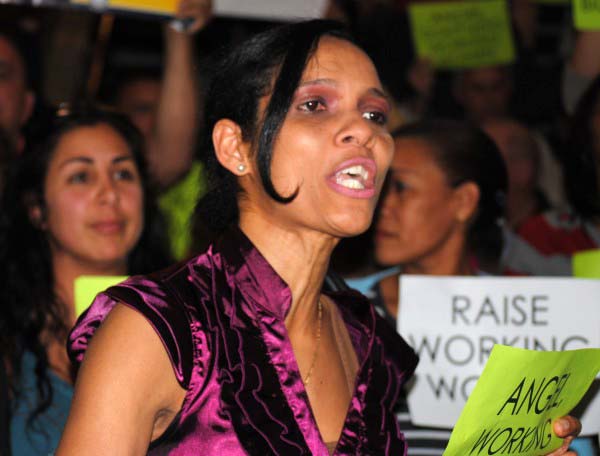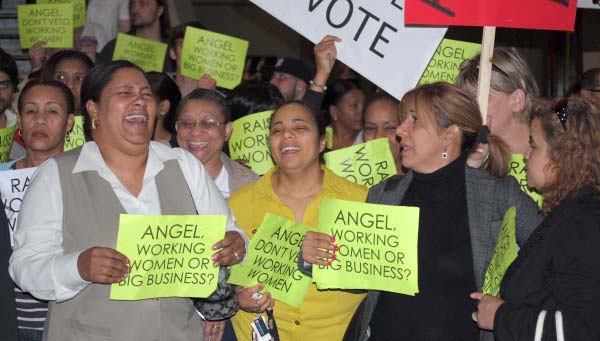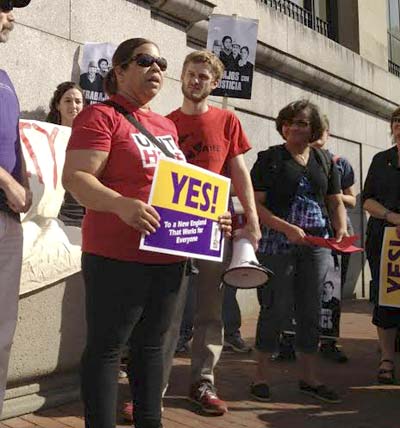Honest, paywall-free news is rare. Please support our boldly independent journalism with a donation of any size.
Jack Temple, a specialist on minimum wage issues at the National Employment Law Project (NELP), told Truthout that he has observed “a flourishing of new approaches to raising minimum wages.” Temple cites recent successes in raising entry-level salaries for workers in hotels in Long Beach, California, and for employees in the Washington State city of SeaTac.
Led by the union UNITE HERE, Local 217 (that includes members in Rhode Island and Connecticut), the city council of Providence, Rhode Island, has received a petition signed by 1,000 residents to raise the minimum wage of hotel workers to $15 per hour. Instead of passing a higher floor on hospitality industry wages into law, the city council has scheduled a vote this week to place a citizen initiative on the ballot. Should the city council vote “no,” UNITE HERE – working with other unions and grassroots organizations – is prepared to gather enough signatures to bypass the council and meet the legal requirements for a citywide ballot in November.
 Supporters of a $15 minimum wage for hotel workers rally in Providence city hall. (Photo: Chris Cook)
Supporters of a $15 minimum wage for hotel workers rally in Providence city hall. (Photo: Chris Cook)
However, even before the city council has taken a formal position on mandating higher hotel salaries, Democratic State Representative Raymond Gallison (District 69-Rhode Island) introduced a bill that would preempt local municipalities in the state from enacting higher minimum wages than the state’s minimum. Currently, Gallison’s bill has been inserted into the Rhode Island state budget (apparently with the support of the Democratic leadership), where it is scheduled for a vote in the Rhode Island house on Thursday.
Chris Cook, shop steward for UNITE HERE who works in the purchasing and receiving department at the Omni (one of two unionized hotels in Providence), told Truthout that the Rhode Island legislature has only asserted state preemption six times before in recent decades. Although Cook benefits from a union-negotiated wage, he is advocating for non-union workers in the eight city hotels that have no union representation.
“The non-union workers in the hotel across the street from where I work should be getting a livable wage too,” Cook said. “The state wants to imprison them in poverty by denying Providence the right to guarantee a minimum wage.”
As to why a legislature in which both houses are Democratic would squash a possible increased municipal minimum wage law, an article posted on Truthout (“Dark Money, Dirty War: The Corporate Crusade Against Low-Wage Workers”) this week may have the answer. Mariya Strauss reports:
Corporate interests have taken credit for reducing private-sector unions to a fraction of their former strength, and for eroding public-sector collective bargaining, especially since the 2010 “Tea Party midterms.” A resurgence in low-wage worker organizing, sparked by growing inequality in the United States, promises to help defend the rights – and paychecks – of vulnerable workers. But corporations and their paid shills aim to snuff out the movement before it catches fire.
In short, round up the usual suspects of ruthlessly pitting concentrated capital against labor: ALEC (which has a template for anti-minimum wage bills), the Chamber of Commerce, and trade associations (in this case the Rhode Island Hospitality Association) for industries that would have to shell out a liveable wage. No doubt, these groups and more have lobbyists on hand to stamp out any brushfire of workers rising up to receive salaries in excess of the poverty level to sustain a family.
UNITE HERE released a fact sheet that states, “the average Providence hotel housekeeper currently lives below the poverty line . . . . The average wage of housekeepers at the Hilton Providence is $9.50 [per hour]. Assuming a forty-hour work week, this wage is below the US Department of Health and Human Services poverty line for a family of three (before taxes).”
In seeking to raise pay for hotel workers in Providence, there is also a gender issue at play. The largest percentage of large hotel workers (and the proposed Providence ordinance would only apply to overnight lodging facilities of 25 or more beds) are housekeepers – and housekeepers are almost entirely women. Moreover, many of the women cleaning rooms are single mothers doing backbreaking work. UNITE HERE has documented that housekeepers at the Hilton in Providence must service approximately 22 rooms in an eight-hour shift.
 Yileni Ferrares was fired from the Providence Hilton for union organizing activities, while the investor who owns the hotel franchise allegedly receives $4000 in tax breaks a day from the city. (Photo: RIFuture.org)
Yileni Ferrares was fired from the Providence Hilton for union organizing activities, while the investor who owns the hotel franchise allegedly receives $4000 in tax breaks a day from the city. (Photo: RIFuture.org)
Carmen Castillo, a room attendant at a unionized Providence hotel for nearly 20 years and a labor organizer, has become a recognized public face of the hotel minimum wage campaign. That is in part due to the notoriety she received in becoming the first housekeeper elected to a major city council in the United States. (She assumed office, representing Ward 9, in January 2012, as reported in Truthout at the time.)
In talking with Truthout, Castillo emphasized that although she has worked a long time in her position, most housekeepers are physically run down after 10 years of work: “This is a physical job. You have to move your body all day. You are doing the same demanding things over and over again. The rich people don’t appreciate this. Your body starts to become destroyed after 10 years, but you have to keep working because there are no other jobs around. The factories are gone.”
Castillo, a single-mom, is proud that she has been able to provide for her three daughters, currently helping finance one of her children’s college education. She argues that it is the responsibility of the Providence city council to improve the lives of residents and that fair pay for hard work is part of that mandate.
In a survey of 600 Providence voters initiated by UNITE HERE, Dapa Research Inc. found that 66 percent supported the proposed $15 minimum wage for hotel workers. The more significant political implication of the findings was that voters would – by a three-to-one margin – cast their ballots against the likely Democratic candidates for governor and mayor if they impeded the pay increase.
Given that the city of Seattle recently passed a $15 minimum wage requirement for all workers, Truthout asked Jack Temple of NELP about the strategy of targeting a specific industry. For instance, won’t exploited fast-food workers, who are engaged in ongoing wage protests nationally and worldwide, feel left behind?
Because of the well-funded and entrenched effort by wealthy corporations to oppose any increase in the minimum wage, Temple said that a diverse counter strategy should include industry specific initiatives such as the one taking place in Providence. “When you win a living wage in one industry sector, it is easier to start a domino effect that spreads across the board. Hotels and the hospitality industry are one of the largest sources of revenue – and profit – in Providence. Achieving a $15 entry level wage for hotel workers will help pave the way for an all-encompassing minimum wage,” he said.
Although the Rhode Island Hospitality Association has claimed that a wage increase would hurt the Providence hotel industry, Temple points out that Long Beach hotels have increased their profitability and occupancy since the higher hotel industry minimum wage was passed there in 2012. In addition, at least one Providence hotel, the Renaissance, has been receiving more than one million dollars in tax breaks a year while fighting pay increases for workers.
According to RIFuture.org:
Renaissance room cleaner Santa Brito said Providence residents such as herself are picking up the tax slack for the Procaccianti Group, the Cranston-based multinational real estate holdings firm that bought the property in 2012.
“The City increased the tax rate on my house $427.28 this year,” she said. “I cannot understand why [the hotel] is getting a break on its taxes worth millions of dollars, when I have to pay more in my own taxes. There is something very wrong when the richest corporations are getting breaks and regular Providence residents are paying more, and they’re not even giving good jobs to our city in return.”
 (Photo: RIFuture.org)
(Photo: RIFuture.org)
Carmen Castillo does not let her backbreaking work keep her from advocating for other women who endure a painful, under appreciated job in non-union hotels. “They [the housekeepers] need to have enough money to raise their families, to put food on the table, to take care of the kids and school costs,” Castillo said.
However, in the Rhode Island Statehouse, the lobbying forces of the 1% believe that they have the legislature in their pocket, ready to beat down any attempt to fairly compensate laborers for their work. On Thursday, June 12, the Democratic leadership in Rhode Island is scheduled to decide if it will supper at the groaning board of campaign contributions by forcing workers to struggle to survive, as the hotel industry in Providence continues to prosper.
Carmen Castillo will be watching the outcome at the statehouse armed with a megaphone and a commitment to ensure a better life for her colleagues.
As a Providence councilwoman and community activist, she will continue to battle the prodigious corporate crusade against low-wage workers. It is people like Carmen, if economic justice is to be achieved, who are lighting thousands of brushfires of resistance burning across the nation.
Media that fights fascism
Truthout is funded almost entirely by readers — that’s why we can speak truth to power and cut against the mainstream narrative. But independent journalists at Truthout face mounting political repression under Trump.
We rely on your support to survive McCarthyist censorship. Please make a tax-deductible one-time or monthly donation.
